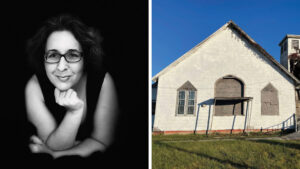When someone dies, it’s natural for us to think of the impact and effects of that person’s life. Of course, that life was significant in and of itself, and profoundly affected the immediate circles of family, friends, community and workplace.
But what difference did that person make in the world? After all, we human beings are fairly limited, and fleeting. How much do we really move the needle or tip the balance of goodness or love or joy or holiness in the world? To make a difference in this world can seem pretty daunting. (I write this knowing that many of you do great and important work.)
Despite this existential reality, we are taught to snatch ongoing legacy and “blessing” from the clutches of our finitude and impermanence. Immortality from mortality. Death, we affirm, is not necessarily our end, nor the end of our potential reverberations. The meaning and significance of our lives, the good we are able to do, can be multiplied after we are gone.
“Zichrono/ah l’vrachah,” “May his/her memory be for a blessing,” is our multiplier effect. And, it’s a positive response to grief. Our wisdom tradition directs us to harvest blessings despite sadness and loss, even for those who are not tzaddikim, the thoroughly righteous.
You’ve probably heard this saying before or seen it (or its abbreviated form, z”l) on a plaque or a donor’s wall, but have you ever wondered what it really means? How many ways can the memory of a person be a blessing? How can a person, either living or no longer alive, “be” a blessing? The answer can be found in two words – affirmation and inspiration.
Memories can generate a wide variety of responses. We can be comforted, for example. The memory of a loved one, or an experience with a loved one, can trigger a retrievable sense of joy or laughter or gratitude and appreciation, or a lesson taught and learned. (And sometimes, the memory can generate less positive associations.)
When the mention of a person’s name serves as an example and an affirmation of a true and essential value, and that person’s behaviors or character traits inspire or motivate us in that direction, then the memory of that person turns into a blessing. We are directed, just by our remembrance, toward the good, toward a desire to add more of such goodness to the world.
This has dawned on me, and has really hit home, after the sudden and tragic death of a young man who I personally knew and loved. He deserves the z”l. Although only 24, he died with a legacy. A legacy, at that age! He leaves in his wake a community inspired to continue his work. There are hundreds of people who hear his name, and their thoughts immediately go to somthing positive, something life- and goodness-affirming, something that promotes health and joy and love.
For some of us, this person’s name conjures up, just as immediately, something other than just joy and love; it can be more like anguish. Such is the price that families and friends of addicts often pay the “sacrifice,” as the AA folks call it. Families and friends often see and experience the harm and damage of descent and pain, and not the giving-back-and-serving-others part of recovery, the storm more than the rainbow that emerged afterward.
This young man’s journey is a case of “yerida l’tzorech aliyah,” “descent for the sake of ascent.” He rose to great heights, even while battling in the depths – heights in terms of humaneness and humanity. His goodness and healthiness were emerging. And he had a zeal for good deeds, an enthusiastic exuberance, running, literally and figuratively, to help someone else stay above water, to stay sober.
He was always busy with such opportunities: daily texts and calls to encourage others; driving carloads of people to meetings; and, in general, caring. For so many, he was a source of uplift. He raised your spirits, lifting you up with humor and laughter and playfulness, or encouragement, or insistence (not taking no for an answer). He was one of those “wounded healers,” helping others who shared his own kind of pain or challenge; transforming his own struggles and sufferings into a gift in the world. “Hi. We’re gonna be best friends.”
The mere fact of this article, publicly acknowledging a crisis of addiction and overdose in our extended networks of those we know and love, is a “blessing” harvested from this tragedy. He has enlisted others in his purposes. This is his legacy. His memory will be an ongoing inspiration and blessing.
 Rabbi Geoff Basik is spiritual leader of the Kol HaLev Synagogue Community in North Baltimore.
Rabbi Geoff Basik is spiritual leader of the Kol HaLev Synagogue Community in North Baltimore.





